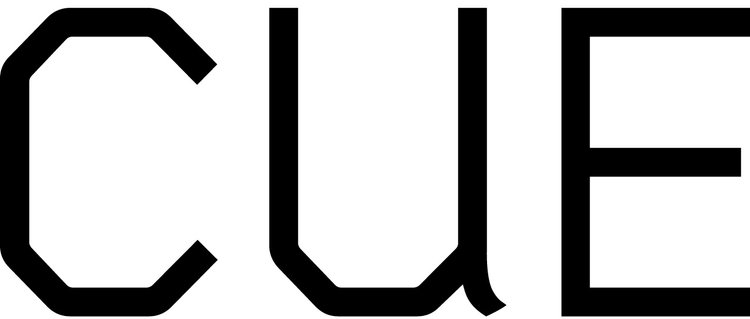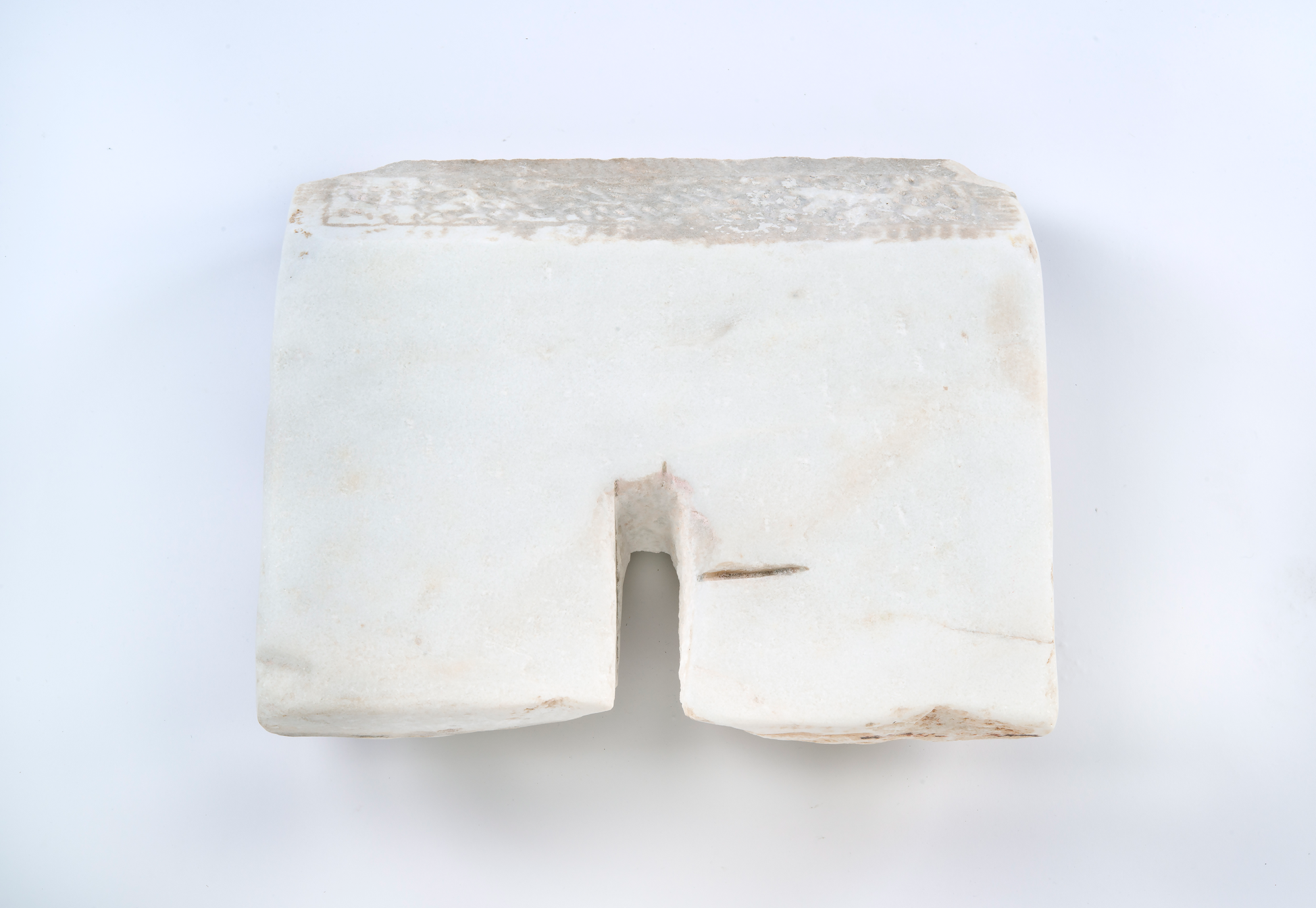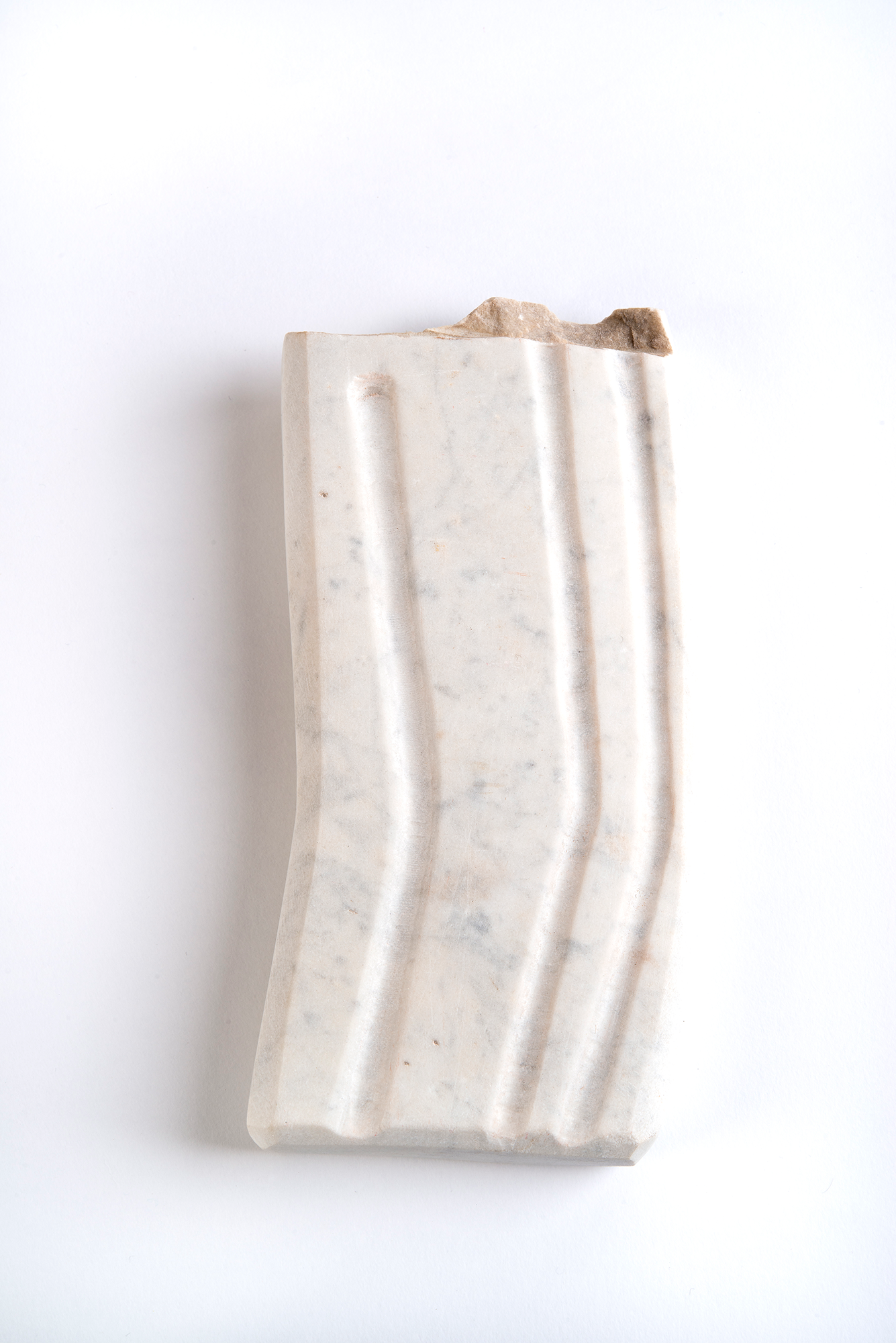James Maurelle, Edson, 2020. wood, brick, paint, adhesive, glass, soil, metal, and shoe polish, 25 x 13 x 30.5 inches. Photo by Karen Mauch.
James Maurelle: On-Site
Curator-Mentor: Odili Donald Odita
September 17 – October 23, 2021
Opening Reception
Friday, September 17, 6-8pm
Flatted Fifths
A 24-hour performance from 10am Friday, October 1 to 10am Saturday, October 2
Artist Talk with James Maurelle and Odili Donald Odita
Friday, October 8, 6-7pm ET
CUE Art Foundation is pleased to present On-Site, a solo exhibition by James Maurelle, curated and mentored by Odili Donald Odita. The exhibition consists of sculptures and prints crafted from materials such as wood, metal, and found objects that weld form and function with Black cultural histories. Through a formal engagement with a vernacular derived from Black American traditions of making and African woodworking traditions, the work celebrates methods of defiance and achievement in the face of oppressive systems and structures, speaking to what Odita refers to as “the poetics of Black people and the Black experience.”
The triumphs and subversions of Black athletes navigating what scholar Christina Sharpe calls the climate of anti-Blackness are recurrent themes in Maurelle’s work. Edson, named after Edson Arantes do Nascimento (better known as Pelé), is an assemblage of found wood resembling a footrest for shining shoes topped with sharp wooden spikes, recalling the manual labor the soccer star engaged in as a child in order to help support his family. Sky Hooks, named after the basketball shot famously perfected by Kareem Abdul-Jabbar, consists of a scythe-shaped tool with two loops of delicately, decoratively carved wood at its top in place of a blade; loops that appear just large enough to hold human wrists. Friday Night references tennis legend Althea Gibson and consists of table tennis paddles with extended handles made from vintage hot combs. This intervention draws attention to the public scrutiny and social pressures that have followed the visibility of successful Black female athletes throughout history, particularly with regards to appearance and beauty standards.
Many of Maurelle’s sculptures recall the labor and endurance involved with their suggested use, and reflect the artist's own labor and endurance in their creation as he reckons with historic events and figures and transcribes them into physical objects. In Fred, the bullet wound described in the autopsy report of murdered Black Panther Party Chairman Fred Hampton is rendered in an otherwise abstracted wooden bust, painstakingly shaved down during a process that elicited Maurelle’s own blood and spit. These associations are further revealed in works such as Who’s Next…, in which the backrest of a wooden chair hangs limp, and B. Natchez, a formally beautiful yet menacing object in its recall of a pillory with nails exposed on one side. The artist will further explore themes of labor, endurance, and visibility during a 24 hour live-streamed performance in which Maurelle will bring parts of his studio into the gallery and work in public view from 10am on Friday, October 1 to 10am on Saturday, October 2.
Maurelle’s work holds space for the simultaneity of Black agency, resiliency, and excellence in the face of an ongoing spectrum of violence leveraged against Black individuals and communities by white supremacy. He works across space and time, calling the past into the present and future as he imbues his subjects and objects with new meaning. In her catalogue essay, Kinaya Hassane writes, “Although Maurelle makes frequent and overt references to the political through his invocation of Black cultural figures and motifs, he rejects the paradigm frequently imposed upon his peers by a white-dominated art world. This paradigm often favors artists who are primed to respond to their continued marginalization by demanding “a seat at the table” and participating in an extractive economy that mines Black creativity to benefit unequal systems and institutions. Maurelle, on the other hand, attempts to reject the terms of these transactional relationships and instead draws viewers into his world, wherein the lines between art and craft, the personal and the political, the abstract and the tangible are tactfully blurred.”
James Maurelle, Friday Night, 2021. wood, brass, adhesive,
and sandpaper, 6.25 x 14 x 0.5 inches. Photo by Karen Mauch.
James Maurelle is an interdisciplinary artist—sculpture, video, photography, and sound art are his analog and digital primes. His work has been shown in solo and group exhibitions in New York, Minneapolis-Saint Paul, Austin, Philadelphia, New Orleans, Richmond, Cincinnati, and San Francisco. Maurelle received his BFA from the San Francisco Art Institute and his MFA from the University of Pennsylvania. He was a recipient of the Skowhegan School of Painting and Sculpture Fellowship in 2015.
Odili Donald Odita (b. Enugu, Nigeria; lives and works in Philadelphia) is an abstract painter whose work explores color, both in the figurative historical context and in the sociopolitical sense. He is best known for his large-scale canvases with kaleidoscopic patterns and vibrant hues, which he uses to reflect the human condition. For Odita, color is at once a distinct phenomenon and a vehicle for mirroring the complexity of the world. He has presented exhibitions at the Philadelphia Museum of Art (2021); Virginia Museum of Fine Arts, Richmond (2020-21); Laumeier Sculpture Park, St. Louis (2020); Institute of Contemporary Art, Miami (2019-21); Nasher Museum of Art, Duke University, Durham (2015–17); Savannah College of Art and Design (2012); and the New Orleans Museum of Art (2011), among other institutions. Odita is represented by Jack Shainman Gallery, New York.
The exhibition will be accompanied by a 32-page color catalogue, with texts by James Maurelle, Odili Donald, Odita, and Kinaya Hassane. The catalogue will be available online and free of charge to gallery visitors. For more information please contact Programs Director Lilly Hern-Fondation at lilly@cueartfoundation.org.
Catalogue essay: “Retooling the Systemic” by Kinaya Hassane






























![Installation view of James Maurelle: On-Site . Photo by Mason Wilson. [Image description: An angled photo of a long wooden sculpture hanging on a wall with two flat pieces with a delicate design.]](https://images.squarespace-cdn.com/content/v1/51f13e79e4b0799d35dfa1a8/1633549986481-6FAJ4S9R28PSCSV6G1XE/JamesMaurelle_+-+56.jpeg)
![Installation view of James Maurelle: On-Site . [Image description: A picture of a gallery on the far wall are three large black triptychs. In the center of the room are wooden sculptures that are on the floor and on white pedestals.]](https://images.squarespace-cdn.com/content/v1/51f13e79e4b0799d35dfa1a8/1634161133478-U428XCJ6W1XONYZ3K4ND/IMG-5903+%281%29.jpg)


![Installation view of James Maurelle: On-Site . [Image description: A photo of a gallery, on the far side wall is a large panel of a woman holding a racket with a gold halo. Around the gallery are wooden sculptures.]](https://images.squarespace-cdn.com/content/v1/51f13e79e4b0799d35dfa1a8/1634161004463-AC7PQI9P3QW6DUKLTM0N/IMG-5910+%281%29.JPG)

